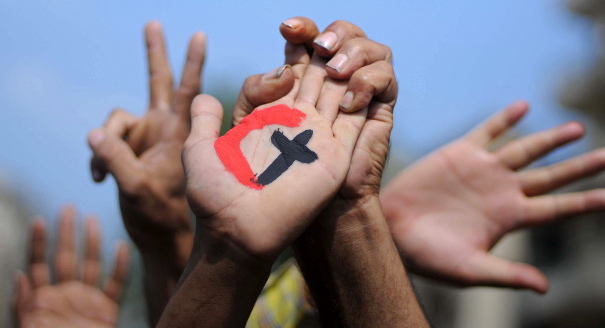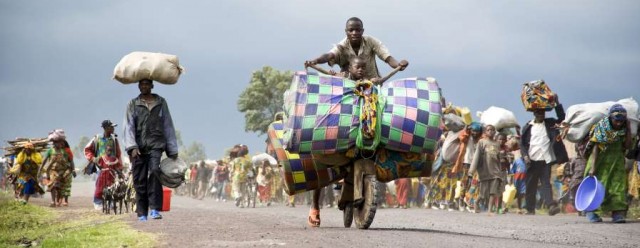From a rally outside the House of Lords in London, to a protest in Egypt’s Aswan – Milosz Zak recounts his experiences with the Copts in Morsi-era Egypt, a country with a pluralistic society, for a time captured by the democratically elected, exclusionary politics of an Islamist majority, now in its second attempt at an inclusive democracy, following the popularly supported military coup.
Luxor – Economically blind government policy and the collapse of tourism
After leaving Cairo I found myself in Luxor in Upper Egypt. Shockingly, Morsi awarded the Luxor Governorate to a former extremist, involved in the 1997 Hatshepsut Temple massacre of 62 people, the majority of which were foreign tourists.
Everything, however, seemed quiet in Luxor, with tourist numbers estimated by local guides at less than 10% of what they usually were. The temples and tombs were virtually empty, with no more than a hundred visitors at any one time and place. Dozens of 5-star cruise ships lay moored on the riverbank, and not only because it was the end of the tourist season. Tourism had surpassed the Suez Canal as a source of national income already a decade before – I read the news, I knew I was witnessing the near-collapse of a critical economic sector.
Guides openly complained that the Morsi government behaved ignorantly, as if it did not know that the flow of tourists was the lifeblood of the Egyptian economy, not only the Nile river – most had family out of work, and themselves struggled to find work – “Freelancing” became a common term.
It was then that I heard that a protest was planned for a Saturday in Cairo’s Tahrir Square; I felt relieved, having left Cairo days before, dodging any potentially difficult situations there.
How wrong I was.
Aswan – Unintentionally attending a protest and witnessing selective policing
By the time I reached Egypt’s Nubia and the city of Aswan, it became apparent that protests in Tahrir Square were routinely reciprocated across Egyptian cities, from Alexandria all the way to Aswan. But again, Aswan seemed quiet, or so it seemed.
Earlier in the day, I decided I would have dinner at Agatha Christie’s famed Old Cataract Hotel, mainly because Aswan lacks the kinds of restaurants I was used to, health advisories warned against street food, most hotels did not have open restaurants because of the lack of tourists, and I had done the Nubian village experience the day before.
It started to get dark, and it was time to return to my hotel on the East bank of the Nile, 500 metres from the Archangel Michael Coptic Orthodox Cathedral which dominates Aswan from a raised plateau. The gates were open, and Egyptian Copts were filing out, some running down the hill towards a roundabout nearer the city centre – at first I thought nothing of it, especially since many other Egyptians, men and women, seemed to be going about their business. There were also other German and French-speaking tourists about, walking along the bank of the river, probably trying to see Aswan’s Souq (market) at night.
[captionpix align=”left” theme=”elegant” width=”350″ imgsrc=”http://www.ehabweb.net/wp-content/uploads/2012/07/070314-100.jpg” captiontext=”Archangel Michael Coptic Orthodox Cathedral, Aswan.”]
It became clear that something was happening there. I could make out a minaret, and some gilded Arabic script where a Mosque or Madrasa (religious school) was probably located when we came upon army trucks with hard tops, iron bars for windows, the typical blue-dressed police along with others in brown desert camouflage with those tell-tale riot police helmets. They stood in pairs, waiting.
These security forces sported rifle-like weapons with can-like gadgets attached at the end, perhaps some sort of gas canister launching mechanism. They kept to one side of the main street, allowing tourists an unobstructed view of what was going on at the roundabout.
It was a very surreal experience – you could tell right away that this was protest. Our presence there could have been described as plate tectonics; two cultures slowly and uncomfortably nudging by, as we slowly walked down one side of the promenade, physically unhindered, while a crowd of close to a thousand chanted angrily towards the entrance of the Mosque, directly to the right of us – all the while with the riot squads looking on.
It was well known that the Morsi government spent tens of millions of dollars on tear gas, while cutting subsidies on food staples. I did not smell any tear gas at that moment.
The majority of those gathered were dressed in traditional jellabiyas chanting in protest in the centre of the roundabout. The police had everything surrounded with vehicles and movable shields, which stopped the flow of traffic. It became clear, however, that those dressed in traditional garb had some sort of issue with those who ran down a few moments before from the Coptic Cathedral at the top of the hill; arguments broke out with some pushing the others aside. It was impossible to know who started it, or what it was all about, and while the Germans and the French in our group scattered down the embankment to their hotels, we stayed on for a while longer.
The protestors never got close to the riverbank, and the crowd was always facing the Mosque, there was no danger, and I believed it was possible to observe the action in safety.
I did not know what the scuffle was all about, or what was said. It was clear, however, that the security forces would periodically intervene in the scuffles between those originally gathered in the roundabout and those who came from the Cathedral. Time and time again, it would be the Copt who would be the one dragged away. There were no beatings or any sort of police brutality on the street – no blood, but it seemed strange whom they chose for holding.
Deciding it was time to go, I proceeded to leave the area of the roundabout only to come upon what appeared to be the detainees just a few metres down the road – the hard-top trucks were put into use!
They were filled with protestors singing and rhythmically banging on the interior walls of those trucks. Whatever they were singing, it must have amused the police gathered around the vehicles, because they were all smiling. Perhaps the song was about them, especially since graffiti sporting the anti-policy acronym A.C.A.B. (all cops are bastards), lined every alley and street in the area.
Although it is impossible to determine exactly what the protest was about, or how the riot police in Aswan operated to manage the situation, it did appear that the police preferred to detain the Copts who joined and argued with those already gathered rather than hold the others. Perhaps this was not the case, and there was a normal distribution or protestors in those hard-top trucks, but it did make me consider the place of the Christian Copts in Egypt vis-à-vis other Egyptians and the entrenched state apparatus – what Morsi called the “Deep State”, which conspired against him and the Islamists.
A month-and-a-half later, the Tamrod (Rebel) movement gathered enough signatures across Egypt against President Morsi to trigger a series of events which led to a military coup – one of the most spectacular ousters of democratically elected Islamist leaders in the region’s history.
In the end, it matters little if a country’s constitution guarantees the rights of minorities if the police will not step in and stop rioters from attacking people, or doing their job selectively.
Egypt’s transition will not end at the next democratic election when a more inclusive government will take the country forward – the transition will also have to be processed internally, by individuals and by the many elements of Egypt’s pluralistic society, as a whole.
For the rest of Milosz Zak’s three part series see:
Part One: Egypt before the Coup (Part One): “London Calling”, Sidelined Pluralism, and the Rule of the Majority
Part Two: Egypt before the Coup (Part Two): Insular Communities, Uneasy Coexistence, and Morsi’s Respect for Religions




